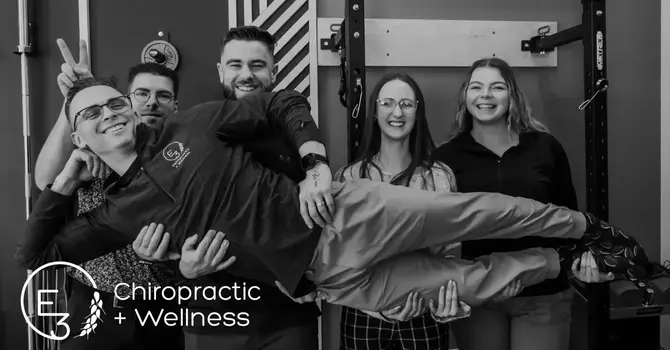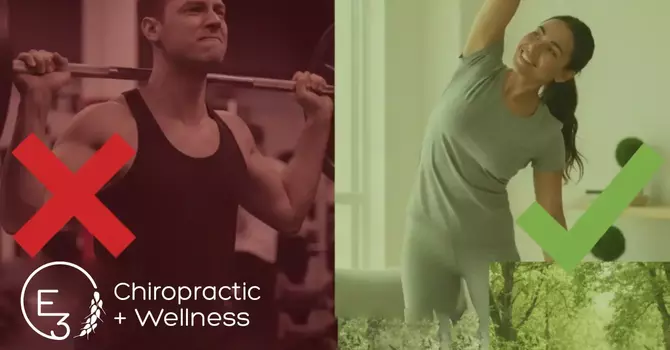
When it comes to working out, most people focus on the training itself—lifting heavier, running faster, or pushing harder. But what often gets overlooked is one of the most important pieces of performance and recovery: nutrition. What you eat before and after your workouts doesn’t just affect energy levels—it plays a critical role in injury prevention, recovery, and long-term performance.
As a Saskatoon Chiropractor, I’ve seen countless athletes and active adults frustrated by recurring injuries that could have been prevented with the right fueling strategy. At E3 Chiropractic + Wellness, we take a holistic approach to care, and that means not only addressing pain but also educating our patients on how lifestyle habits—including nutrition—impact movement, recovery, and resilience.
Let’s break down how proper pre- and post-workout nutrition can help you stay strong, recover faster, and reduce your risk of injury.
Why Nutrition Matters for Injury Prevention
Training is stress. Every time you hit the gym, track, or pool, you’re creating tiny amounts of muscle fiber damage, depleting energy stores, and stressing your joints and tissues. This isn’t a bad thing—in fact, it’s exactly how we get stronger. But if your body doesn’t have the right building blocks to repair itself, you increase the risk of:
- Muscle strains
- Joint irritation
- Slow recovery times
- Overuse injuries
Nutrition provides the raw materials your body needs to adapt, recover, and build resilience. Think of it like fueling a construction site—without the right supplies, the project gets delayed, cut corners, or fails entirely.
Pre-Workout Nutrition: Fueling for Performance and Protection
The Goal: Energy and Injury Prevention
The purpose of your pre-workout meal or snack is simple: give your body enough energy to perform at its best while protecting muscles and joints from excessive breakdown.
What to Eat Before Your Workout
Carbohydrates: Your Primary Fuel
Carbs provide glucose, which fuels your muscles during exercise. Without adequate carbs, your body is more likely to burn through muscle tissue for energy.
Examples: oatmeal, banana, rice cakes, whole grain toast
Protein: Protecting Your Muscles
Consuming protein before training helps reduce muscle breakdown during exercise.
Examples: Greek yogurt, eggs, protein shake, cottage cheese
Fluids: Hydration is Non-Negotiable
Even slight dehydration can increase injury risk by reducing joint lubrication and slowing reaction time.
Drink at least one glass of water (or an electrolyte beverage if sweating heavily) before training.
Timing Matters
2–3 hours before: Eat a balanced meal with protein, complex carbs, and a bit of healthy fat.
30–60 minutes before: Have a lighter snack—something easy to digest, mostly carbs with a little protein.
Example Pre-Workout Meal (2–3 hours before training):
- Grilled chicken, sweet potato, and roasted vegetables
Example Pre-Workout Snack (30–60 minutes before training):
- Banana with a scoop of almond butter or a protein shake with fruit
Post-Workout Nutrition: Recover, Rebuild, and Protect
The Goal: Repair and Recovery
After a workout, your muscles are primed to absorb nutrients. This is your body’s window of opportunity to refuel and repair. Skipping post-workout nutrition means slower recovery, increased soreness, and greater risk of injury over time.
What to Eat After Your Workout
Protein: Repairing and Building Muscle
Aim for 20–40 grams of protein to kickstart muscle protein synthesis.
- Examples: protein shake, chicken, fish, lean beef, eggs
Carbohydrates: Refueling Energy Stores
Restoring glycogen is crucial for recovery, especially if you train frequently.
- Examples: rice, quinoa, potatoes, fruit
Healthy Fats: Reducing Inflammation
A moderate amount of omega-3-rich fats helps reduce inflammation and protect joints.
- Examples: salmon, chia seeds, walnuts, avocado
Fluids + Electrolytes: Restoring Balance
Replenish what you’ve lost through sweat to prevent cramping and stiffness.
Timing Matters
Within 30–60 minutes post-training is ideal. Your muscles are more receptive to nutrients during this time.
Example Post-Workout Meal:
- Salmon with quinoa and roasted vegetables + a glass of water or electrolyte drink
How Poor Nutrition Increases Injury Risk
It’s not just about what you eat around your workouts—long-term habits matter. Poor nutrition can contribute to:
Weaker connective tissue – Inadequate protein slows collagen repair, leading to ligament and tendon issues.
- Increased inflammation – Diets high in processed foods and low in omega-3s make recovery harder.
- Slower recovery – Without replenishing glycogen, the body stays in a stressed state longer.
- Muscle imbalances – Skipping meals or protein can lead to breakdown of lean muscle, increasing injury risk.
At E3 Chiropractic + Wellness, we see this all the time: athletes frustrated by recurring pain or stiffness that isn’t just about their training load—it’s about how they’re fueling their body.
Practical Tips to Stay Consistent
Plan ahead. Meal prep makes it easier to have healthy options ready.
Don’t skip breakfast. Starting the day with protein and carbs sets the tone.
Hydrate throughout the day. Don’t wait until you’re thirsty—by then you’re already behind.
Supplement wisely. Protein powder, electrolytes, or omega-3 supplements can help fill gaps.
Listen to your body. Soreness that lingers too long or constant fatigue is often a sign your nutrition isn’t supporting your training.
How E3 Chiropractic + Wellness Can Help
As a Saskatoon Chiropractor, my role isn’t just to help patients get out of pain—it’s to help them stay active, perform at their best, and prevent injuries before they happen. At E3 Chiropractic + Wellness, we combine:
- Expert movement assessments – to identify where your body is most at risk.
- Chiropractic care – to restore joint mobility and relieve stress on tissues.
- Rehab and strength programs – to make your body more resilient.
- Lifestyle guidance – including advice on nutrition, hydration, and recovery.
When you put it all together—training, recovery, and nutrition—you don’t just perform better in the gym. You build a stronger, healthier, more resilient body for the long haul.
Final Thoughts
Injury prevention isn’t just about what happens in the gym or on the field. It’s also about what happens in your kitchen. Pre- and post-workout nutrition gives your body the tools it needs to repair, recover, and thrive.
If you’re training hard but still dealing with pain, nagging injuries, or slow recovery, it might not be your workouts that are the problem. It might be how you’re fueling your body.
At E3 Chiropractic + Wellness, we’re here to help you connect the dots between movement, recovery, and nutrition so you can keep doing the activities you love—without setbacks.
Key Takeaway: The right fuel before and after workouts doesn’t just boost performance—it helps prevent injuries. And when combined with expert care from a Saskatoon Chiropractor at E3 Chiropractic + Wellness, you’ll have the tools to stay strong, mobile, and pain-free. Click HERE to book a discovery with us and start to take charge of your life and create a heathlier lifestyle.





